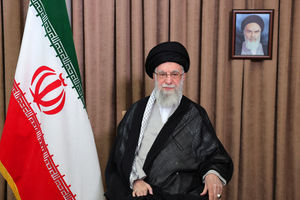
Mr Martin Machuki and his wife Ms Wanja Mwaura in Israel.
When the first Iran missile hit Tel Aviv on Friday night, Ms Wanja Mwaura was planning to celebrate her birthday in the Israeli city.
For the last three days, as the war between Israel and Iran rages on, Ms Mwaura says she is traumatised, having never before been caught up in such conflict.
“Since the war started, things have changed. One moment we are in the house, the next we are rushing to bunkers to keep away from the bombs and missiles,” said Ms Mwaura, 41, who has been living in Israel for the last eight months.
A bunker is a reinforced underground shelter, typically for use in wartime.
According to Ms Mwaura, the apartments in Tel-Aviv struck by missiles, killing several people, are not far from where she lives with her husband, Mr Martin Machuki.
Ms Mwaura, who travelled to Israel last October to seek medical attention at the Sheba Global Hospital, Tel Hashomer, said the missile strikes occurred a few minutes after they had rushed into a bunker.

Mr Martin Machuki and his wife Ms Wanja Mwaura in Israel.
“I have never seen this devastation, the blasts are too loud and red alerts keep on coming asking us to rush to safe houses and bunkers for our own safety,” said Ms Mwaura, who explained she has been discharged from hospital but regularly goes for check-ups.
The red alerts are usually sent to mobile phones of anyone within Israel.
National security threat
“In the next few minutes, alerts are expected in your area. If an alert is received, enter the protected space and stay there until further notice,” reads a red alert seen by the Nation.
Ms Mwaura said sleep is interrupted by the constant red alerts as the Israel Defence Force (IDF) scrambles to intercept the missiles fired by Iran. She said the bunkers are strategically placed.
“Where I live, the bunkers near me are just 95 metres away, and there is also another one 145 metres away,” she said, adding that the bunkers also cover public offices, hospitals and streets.
Mr Machuki said they have had a safe stay since arrival in Israel on October 13, 2024, but the calm was shattered this weekend.
“The situation is a national security threat, but the safety measures in place are very satisfying. We have safe houses where we are asked to rush to in case of any danger,” he explained.
He added that the only danger comes from falling debris from intercepted rocket missiles.
Ms Mwaura first hit news headlines in Kenya when she reunited with her primary school classmate who had become a drug addict. Through her Wanja Mwaura Foundation, which is based in Kiserian, Kajiado County, she transformed the life of Patrick Wanjiru, but he later died after overcoming bhang and cocaine addiction.
The war broke out a month before Ms Mwaura was scheduled to return home after completing treatment. She said she would wish to return home immediately, but the Israeli air space has been closed. She said she is glad the Kenyan community in Israel is tight knit.
Kenyans affected by the war
“Kenyans here are very accommodative, I was not experiencing any home sickness. They decided to rent a house for me and they usually pay the cost, they ensure that my husband and I eat. I have been feeling at home until the strikes started,” she said.
On Sunday, the Israel government notified citizens of a state of emergency across the country and adjusted homeland security guidelines. These include a ban on educational activities, gatherings and workplace operations except for essential sectors.
Mr Stanley Muchiri, the chairman of Kenyans living in Israel, said they had not received reports of any Kenyan affected by the war.

Mr Stanley Muchiri who is the chairman of Kenyans living in Israel.
“We have several groups where people share their grievances or challenges and we try to help solve such issues,” said Mr Muchiri who has been in Israel since 2020 and installs air conditioners on newly constructed buildings.
“The blasts are loud and whenever we are in the bunkers we hold our breath. The kids look traumatised and cry a lot. This is not what we are used to,” he said.
Mr Muchiri lauded the Kenyan embassy in Israel.
“They always keep us informed and are ready to assist us when in need,” he said.







